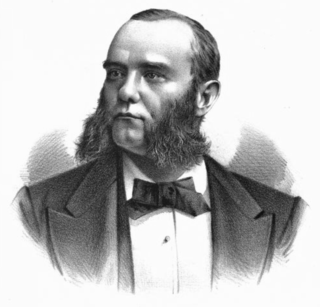
Carter Henry Harrison IV was an American newspaper publisher and Democratic politician who served a total of five terms as mayor of Chicago but failed in his attempt to become his party's presidential nominee in 1904. Descended from aristocratic Virginia families and the son of five-term Chicago mayor Carter Harrison Sr., this Carter Harrison (IV) became the first native Chicagoan elected its mayor.

John Peter Altgeld was an American politician and the 20th Governor of Illinois, serving from 1893 until 1897. He was the first Democrat to govern that state since the 1850s. A leading figure of the Progressive movement, Altgeld signed workplace safety and child labor laws, pardoned three of the men convicted in the Haymarket Affair, and rejected calls in 1894 to break up the Pullman strike by force. In 1896 he was a leader of the progressive wing of the Democratic Party, opposing President Grover Cleveland and the conservative Bourbon Democrats. He was defeated for reelection in 1896 in an intensely fought, bitter campaign.

Washington Hesing (1849-1897) was an American newspaper editor and political figure primarily known for his ownership of the Illinois Staats-Zeitung and his term as postmaster of Chicago during the second term of President Grover Cleveland.

In the Chicago mayoral election of 1905, Democrat Edward F. Dunne defeated Republican John Maynard Harlan and Socialist John Collins.

In the Chicago mayoral special election of 1893, John Patrick Hopkins was elected mayor. The election was triggered by the assassination of mayor Carter Harrison Sr.. Following Harrison's death, Republican George Bell Swift had been appointed by City Council to serve as acting mayor until the special election could be held. In the election, which was held December 19, Hopkins narrowly defeated Swift by a half-percent margin.

In the Chicago mayoral election of 1893, Democrat Carter Harrison Sr. won election, returning him the mayor's office for a (then-record) fifth non-consecutive term as mayor of Chicago. Harrison won a majority of the vote, defeating the Republican nominee, businessman Samuel W. Allerton, by a ten point margin. He also defeated two third-party candidates: United Citizens nominee DeWitt Clinton Cregier and Socialist Labor Party nominee Henry Ehrenpreis, neither of whom received strong support.

In the Chicago mayoral election of 1911, Democrat Carter Harrison Jr. was elected to his fifth non-consecutive term as mayor, tying the then-record set by his father Carter Harrison Sr. for the most Chicago mayoral election victories. Harrison defeated Republican nominee Charles E. Merriam and Socialist nominee William E. Rodriguez.

In the Chicago mayoral election of 1907, Republican Fred A. Busse defeated Democratic incumbent Edward F. Dunne.

In the Chicago mayoral election of 1915, Republican William Hale Thompson defeated Democrat Robert Sweitzer.

In the Chicago mayoral election of 1923, Democrat William E. Dever defeated Republican Arthur C. Lueder and Socialist William A. Cunnea. Elections were held on April 3, the same day as aldermanic runoffs.

The Chicago mayoral election of 1891 saw "Reform" candidate Hempstead Washburne narrowly win a four-way race against incumbent Democrat DeWitt Clinton Cregier, former mayor Carter Harrison Sr., and Citizens Party nominee Elmer Washburn. Also running was Socialist Labor candidate Thomas J. Morgan. Due to the four-way split in popular support, Washburne won with merely a 28.83% vote share and less than a quarter-of-a-percent margin of victory over second-place finisher Cregier.

In the Chicago mayoral election of 1895, was held on tuesday April 2 Republican candidate George Bell Swift was elected, winning a majority of the vote and defeating Democratic nominee Frank Wenter by more than a twenty point margin.

In the Chicago mayoral election of 1899, Democrat Carter Harrison Jr. was reelected, winning a plurality of the vote and defeating Republican candidate Zina R. Carter, former Illinois governor John Peter Altgeld, as well as several minor candidates by a double-digit margin.

In the Chicago mayoral election of 1901, Democrat Carter Harrison Jr. was reelected to a third term, defeating Republican candidate Elbridge Hanecy by a 9.5% margin of victory.

In the Chicago mayoral election of 1903, Democrat Carter Harrison Jr. was reelected to a fourth term, defeating Republican candidate Graeme Stewart.

The Chicago mayoral election of 1947 was first the primary in February 1947, which was followed by the general on April 1, 1947. The election saw Democrat Martin H. Kennelly being elected, defeating Republican Russell Root by a more-than 17% margin of victory.

The Chicago mayoral election of 1887 saw Republican John A. Roche win by a landslide, receiving more than a two-thirds majority of the vote, defeating Socialist Robert S. Nelson by more than 36 points.
The Chicago Traction Wars was a political conflict which took place in Chicago primarily from the mid-1890s through the early 1910s. It concerned the franchise and ownership of streetcar lines. At the time it was one of the dominant political issues in the city and was a central issue of several mayoral elections and shaped the tenures of several mayors, particularly those of Carter Harrison Jr. and Edward Fitzsimmons Dunne.

John Maynard Harlan was an American lawyer and politician who served as a member of the Chicago City Council. Harlan, multiple times, ran for the mayoralty of Chicago.

The 1920 Illinois gubernatorial election was held on November 2, 1920.











